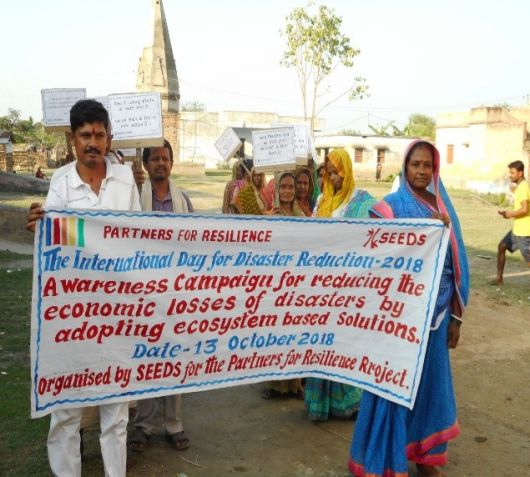31/10/2018 - Ecosystem-based solutions for disaster risk reduction

On 13 October more than 55 participants from different villages in Mahishi block, Saharsa district, Bihar in the Kosi river basin, came together to raise awareness on ecosystem-based solutions for disaster risk reduction. The villages in the Kosi river basin are often hit by natural hazards, being it floods during monsoon time, or drought in the summer period.
At the event PfR partner SEEDS India promoted and advocated for protection and restoration of wetland ecosystems among the community members who depend on the ecosystem services provided by the wetlands. The PfR team along with the community members walked along the village rallying support and signatures for the awareness campaign.
The campaign brought together different stakeholders, including local government, and the speakers presented evidence on the efficacy and cost-effectiveness of community-level ecosystem-based disaster risk reduction.
With the event PfR supports the international Sendai Seven Campaign, highlighting the need to increase societal and environmental resilience in the anticipation of increasing disaster risks, through cooperation among different stakeholders and the need for up-scaling investments in Eco-DRR strategies.
The programme coordinator in Bihar spoke about the need for applying ecosystem-based solutions in disaster and climate risk management, such as the conservation, restoration and the sustainable use and management of land, wetlands and other natural resources, in order to enhance resilience and reduce vulnerability of ecosystems and people to adverse effects of disaster and climate change.
In the villages about 200,000 people are drawing sustenance from agriculture and allied activities. The Kosi river is known to frequently change its course, often leading to large areas being flooded, sometimes for long periods, resulting in damaged crops and assets. Intermittent wetlands, locally called ‘tals’, ‘ahars’ and ‘pynes’, are acting as the natural buffers of the landscape – absorbing excess rain and river overflows during the monsoon months and discharging the same during dry months to meet the irrigation needs of the communities.
The landscape of the entire Saharsa district, including that of Mahishi block, has been rendered vulnerable due to unplanned construction of embankments, reclamation of river floodplains and the convergence of wetlands for agriculture. Besides floods, the landscape in recent times faced acute shortage of water in the summer months, primarily due to excess ground water extraction and reduced recharge by wetlands.
Many disaster response measures practiced in the district are reactionary and are centered on relief and rehabilitation. Partners for Resilience India is working on strengthening partner organisations capacity to advocate for ecosystem-based solutions as risk reduction measures for water-mediated disasters within developmental planning. Investing in preventive measures, in this case better water management, the recurrent floods and droughts can be better controlled, and will have less impact on the communities in this region.






